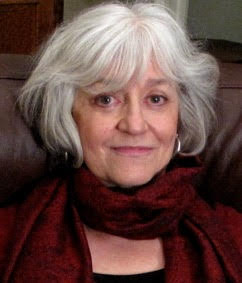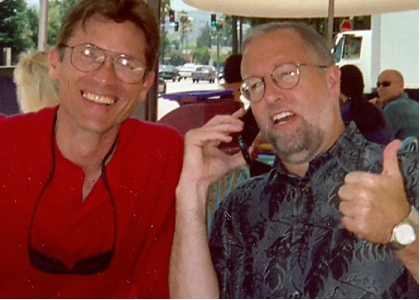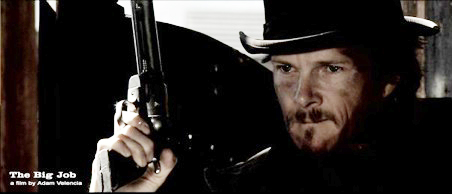Working with Scripts
In This Issue
When I was a student at Goshen College in 1956 I sneaked downtown one dark night to see a movie, A Man Called Peter. I felt guilty even about seeing that religious film, since movie attendance was against the rules. Later during a “Nonconformity Week” series of chapel services, we were warned against seeing DeMille’s The Ten Commandments. The only theater activity on campus were plays entirely directed by students for “literary” programs, and those scripts had to be approved by a censor. Even as recently as 1978, when the Umble theater was dedicated on campus, a strong voice from the church objected, saying the college should first have got permission from the church to launch that previously questioned activity.
How things have changed! Today, Mennonite campuses have theaters and theater programs, show controversial feature films, have television studios and sponsor filmmaking programs. The official publication of Mennonite Church USA, The Mennonite, regularly offers movie reviews. The Mennonite Church sponsors Mennonite Media, which regularly offers critiques of new movies via the online Third Way Cafe and makes documentaries for use by churches and educational and commercial television channels. Dramatic segments in worship services have become commonplace. All such activity is carried out within a context of Anabaptist critique, but the media themselves—theater and film—and the acting, directing and technology that they require have found their useful place in North American Mennonite culture.
This issue of the CMW Journal highlights the work in film and theater that some Mennonite-related artists are engaged in, illustrating different kinds of work and degrees of success. If in some of the essays one also finds a self-consciousness (or even defensiveness) in being a Mennonite involved in the dramatic arts, that is to be expected, considering the distinctive Mennonite culture out of which all of them come. The four writers of scripts for commercial feature films – Don Yost, Joel Kauffman, Collin Friesen and Sidney King -- represent varied control by the writer of the final artistic work and varied relationships of their scripts to Mennonite experience and values.
A script to be turned into a film is probably the most unstable of texts, meaning the kind most liable to be altered in the process of producing the film. In classic filmography, the writer sells the script, which is then altered in major or subtle ways by the producer, director, actors, photographer, and editor. Some such process generated the feature film The Big White (2005), written by Collin Friesen, starring Robin Williams and Holly Hunter, and distributed in North America by Echo Bridge. It was filmed in Manitoba and north Canada. The Big White, which received mixed reviews, was described by one blogger as a “quirky black comedy,” which Friesen elaborates on by saying: “My stories aren’t inherently Canadian or American, they’re just inherently weird.” The script for The Big White was the first one offered to Hollywood producers by Friesen. Although he has sold several others since, he has not yet matched that original achievement. His essay, a kind of wry lament, muses on his experience in Hollywood.
At best, the normal Hollywood way of producing a movie emphasizes “collaboration.” Don Yost and Joel Kauffmann were deliberate collaborators in generating their scripts for two feature films produced for the Disney Channel, Miracle in Lane 2 (2000) and Full Court Miracle (2000). They also discuss several moments when they were involved in the actual production of the scripts. Their essay here is also a dialogic collaboration. Miracle in Lane 2 won the Humanitas Prize in 2000, and Full Court Miracle was nominated for the same prize.
Sidney King exercised more personal control over his feature film, The Pearl Diver (2005), for which he was not only screenwriter but also director. The Pearl Diver was given the Best Narrative Award at the Winnipeg International Film Festival; the Crystal Heart Award at the Heartland Film Festival; and the Grand Jury Prize at the Indianapolis International Film Festival.
The films of these four screenwriters illustrate varied influences from their Mennonite backgrounds. Although Sidney now considers writing a script for an action movie (which would fulfill an Anabaptist emphasis on doing), thus far his work has dealt with explicitly Mennonite subjects. The Pearl Diver depicts a conflict between two Mennonite sisters in Indiana and finds a way to integrate the Swiss-Alsatian tradition with the Dutch-Prussian-Russian experience. For an interpretation of this film, see Julia Kasdorf’s essay in the “Martyrs” issue of this journal (September 2009). The video Sidney produced as a college student dealt with the disappearance of Goshen College student Clayton Kratz in revolutionary Russia.
In their essay, Don Yost and Joel Kauffmann discuss how Mennonite values appear in their films, despite content that is not overtly Mennonite. However, Miracle in Lane 2 is based on the experience of an actual Mennonite family in northern Indiana, and Joel’s first film The Radicals depicts the experience of Michael Sattler, a first-generation Anabaptist martyr. It won the Silver Award at the Houston International Festival.
Although Collin Friesen elsewhere says he is a “lapsed Mennonite,” he opens his essay by saying he was willing to represent himself as a Mennonite on Craigslist, and he was happy to contribute to this issue of the Journal.
Segments from all of the films mentioned in these essays can be found on YouTube.
Vern Thiessen has written over 25 scripts for stage production, not film. Five have been published by Playwrights Canada Press. He won the Governor General’s Award for Drama in 2003 for Einstein’s Gift. Although Hildi Froese Tiessen’s long interview with him was conducted in 2000, its publication in this issue is serendipitous, since it coincides with the opening in Toronto on October 29 of his most successful play, Lenin’s Embalmers, which won critical acclaim in New York City in 2010 and is being translated for productions in Warsaw, Poland, and Tel Aviv, Israel. Like the other writers here, Thiessen discusses some of the negotiations between writer, cast and producers that occur as a script is being staged. The interview opens with the kind of warm personal exchanges between Hildi and Vern that seem to occur whenever two Mennonites meet and get acquainted.
For good measure, we publish a lively, thoughtful personal essay by Jeremy Frey, who as a stage and film actor, becomes a kind of creative pawn in the process of making a work of art. After briefly mentioning his role in Beloved (1998), he focuses on his experience of being the only Caucasian person in an all-black cast producing a play about black experience, Deep Roots by P. J. Gibson. We learn less about how a play is made, and more about what personal effect the process has on the actor. The photograph of Jeremy that accompanies his essay, from The Big Job (2010), probably represents the first time a Mennonite has introduced himself holding a pistol, ready to shoot.
Some current Mennonite screenwriters are not represented here. That is especially true of the many Mennonites who make documentary films, to which a future issue of the Journal of the Center for Mennonite Writing will be devoted.The same is true for Mennonite writers of drama, who will also be featured in a separate future issue. We welcome nominations and submissions.
-- Ervin Beck, Editor
In this issue:
-
0
read more

Don’t Do It! Advice on How to Sort of Make It in Hollywood
by Collin FriesenIt’s overcast today, which is the closest thing to “weather” we’re going to see for a few months. I’m sitting in my soon-to-be repossessed living room, looking up rumspringa on the internet, prepping for an interview I’m doing next week with Spike TV for a show called “1001 Ways to Die.” The show recently posted a message on Craigslist looking for a “Mennonite,” assuming, quite rightly, that a posting looking for “Amish” would be self-defeating. As a former reporter, I know it’s lazy to assume the two groups are interchangeable, but they’re paying, so who am I to argue?
The …
-
0
read more

"Every play should pose a good question": An Interview with Vern Thiessen
by Hildi Froese Tiessen Vern Thiessen in 2003 won the Governor General’s Award for Drama for his play Einstein’s Gift. The author of more than 25 plays, he is one of the most widely produced playwrights in Canada. In 2010 his play Lenin’s Embalmers was well received in New York City when it was produced by the Ensemble Studio Theater. Its first Canadian production opened October 29 in Toronto. It will be translated and produced in Warsaw and Tel Aviv. The script will be published in 2011 by Playwrights Canada Press, which has also published Thiessen’s Blowfish (1998), Apple (2002), Einstein’s Gift (2003), and …
Vern Thiessen in 2003 won the Governor General’s Award for Drama for his play Einstein’s Gift. The author of more than 25 plays, he is one of the most widely produced playwrights in Canada. In 2010 his play Lenin’s Embalmers was well received in New York City when it was produced by the Ensemble Studio Theater. Its first Canadian production opened October 29 in Toronto. It will be translated and produced in Warsaw and Tel Aviv. The script will be published in 2011 by Playwrights Canada Press, which has also published Thiessen’s Blowfish (1998), Apple (2002), Einstein’s Gift (2003), and … -
1
read more

Five Poems
by Charity Gingerich“Currently life is rich and terrifying, and I am finding that writing poetry is a most useful expression of my faith, which right now includes exercising my doubts. Doubt, after all, is a necessary component of faith. How else do we become sure of truth?” – Charity Gingerich
Charity Gingerich’s poems exploded upon us like a mature shrub of lilacs in full flower. The Journal of the Center for Mennonite Writing is pleased to present a selection of these poems for the first time in this issue. Of the first three poems included here, Gingerich writes: “ ‘Some Days Walking Alone,’ ‘Deserving’ and ‘To Sugar Grove Road’ came at the end of an intense, almost visceral cycle of Lenten prayer poems I wrote this spring. I had not realized until now how ‘useful’ writing poetry could be beyond merely intellectual and artistic stimulation. It became an act of the body that nourished the spirit.”
With their long, lush lines, Gingerich’s poems reveal a passion for language and life that is distinctive and compelling, and a sensibility that is steeped in the Mennonite tradition of service to others and a reverence for the natural world.
Austin Hummel, editor of Passages North, has said of Gingerich’s poems, “[they are] ambitious, backward-glancing poems. They speak with an exile’s voice, though with a heart trained not on the self, but on others.” Humble but eager to share her poetic discoveries, Gingerich said of Hummel’s response to her work: “At first I felt strangely ‘exposed,’ as if someone—and a stranger no less—had uncovered a secret of mine. But my consternation mellowed when I realized that this really is a confirmation of what I hope to do/be as a poet, as a person. I want my work to transcend, not just in that otherworldliness that is poetry (sometimes), but I want to transcend the “I-myself,” the “I-as-narcissist.” I want my poetry to be more than just about me.”
We concur that these fine poems offer many rewards to readers. We hope you will enjoy this gift of poetry: lilacs in November. -- AH
-
0
read more

The Mennonite Screenwriter
by Sidney KingScreenwriters tend to spend a lot of time thinking about titles.
In the image-conscious and attention span-challenged world of popular movie-making, a script’s title is the shorthand the reader or producer uses to infer all sorts of things about a script without having to turn a single page: genre, commercial viability, stakes, story hook, character.
A good movie title will tell you exactly what the movie is, and will do so with very few words.
Jaws...good. Ghostbusters...good. Titanic...good.
Potential ticket-buyers don’t even have to look at the poster or watch the trailer to know that they’re probably …
-
0
read more

Misery & Miracles: Our Brief Hollywood Career
by Don Yost and Joel KauffmannPart 1 – From How It All Started to the Peaks and Valleys
Joel:
I got into writing screenplays long before I knew it – or knew that writing screenplays was a craft or career. From the time I snuck into my first movie as a teen (from the corrupting influence of non-Mennonite friends), I was hooked. Movies seemed everything that the rural Mennonite world of the early ‘60s was not: loud, brash, colorful, dramatic and emotive. At first, movies also seemed to lack seriousness. Then, just before I left for college, The Graduate hit the silver screen, proving that …
-
0
read more

White Nights, Black Mondays
by Jeremy FreyAudition: You get what you risk.
One of many cattle calls in the late ‘90s found me landing an extra role in response to the local Casting Director’s hotline: “We’re looking for ‘real people,’” code for non-actors. After years on stage, as an upstart film actor, I was on my way to some of the most rewarding, exciting work possible. Harpo Productions to co-produce with Disney Films. Oprah Winfrey to star alongside Danny Glover, under the direction of Jonathan Demme. And all this in Philadelphia, home of only a few non-independent films each year.
Working on film sets quickly overshadowed …